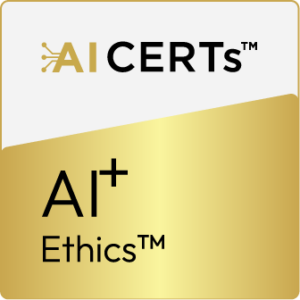- modules: 9
- Examination: 1
- Examination Time: 50 MCQs, 90 Minutes
- Passing Score: 70%
About Certification
The AI+ Ethics Certification is an industry-oriented program enabling professionals to distinguish themselves in ethically utilizing emerging AI technologies. Business and government organizations actively seek ethics professionals to mitigate risks and guide decision-making in AI application design. The brand's values and financial impacts resulting from ethical violations can significantly affect an organization's image. Ethical leaders play a crucial role in implementing strategies to promote fairness, minimize risks, and uphold ethical standards, ensuring the overall well-being of their organizations.
Prerequisites
- Basic knowledge of artificial intelligence, machine learning concepts, and their applications.
- Understanding of the social, cultural, and political implications of AI technologies.
- Understanding of professional ethics, including honesty, integrity, and responsibility.
- Exposure to real-world case studies that highlight ethical dilemmas in AI, promoting practical understanding.
- Ability to critically assess AI technologies and make ethical decisions in designing, deploying, and managing AI systems.
- Familiarity with relevant laws, regulations, and industry standards that govern AI usage.
Certification Modules
- Course Introduction Preview
- 1.1 Introduction to Ethical Considerations in AI Preview
- 1.2 Understanding The Societal Impact of AI Technologies
- 1.3 Strategies for Conducting Social and Ethical Impact Assessments
- 2.1 Exploration of Biases in Data and Algorithms
- 2.2 Strategies for Mitigating Bias and Ensuring Fairness in AI Systems
- 3.1 Importance of Transparent AI Systems Preview
- 3.2 Techniques for Explaining AI Models to Diverse Stakeholders
- 3.3 Guided Projects on Designing and Analysis of AI Systems with Ethical Considerations
- 4.1 Examination of Privacy Concerns Related to AI
- 4.2 Strategies for Ensuring the Security of AI Systems and Data Preview
- 5.1 Concepts of Accountability in AI Development and Deployment
- 5.2 Responsibilities of AI Practitioners and Organizations
- 6.1 Overview of Relevant Laws and Regulations Pertaining to AI Preview
- 6.2 Understanding the Global Regulatory Issues for AI Technologies
- 6.3 Case Studies: GDPR Compliance
- 6.4 Legal Compliance of AI Tools
- 7.1 Introduction to Frameworks for Making Ethical Decisions in AI
- 7.2 Case Studies and Applications of Ethical Decision-Making
- 7.3 Use of Simulation Platforms in Ethical Decision-Making
- 8.1 Principles and Functions of International AI Governance
- 8.2 Best Practices for Integrating AI Ethics into Organizational Policies
- 8.3 Case Studies on AI Governance
- 9.1 Explore Standards like IEEE’s Ethically Aligned Design
- 9.2 Comparative Case Studies on Standard Implementations
- 9.3 Tools for Evaluating AI Systems Against Global Standards
Certification outcome
Upon successful completion of this AI+ Ethics certificate program, participants gain the ability to understand fundamental ethical considerations and their societal impact. They also recognize the influence of biased data and the importance of establishing fair and equitable AI systems. Additionally, participants can implement transparency in AI system development to mitigate bias, comprehend privacy and security concerns in design and deployment, and realize accountability and responsibility in AI system deployment.











